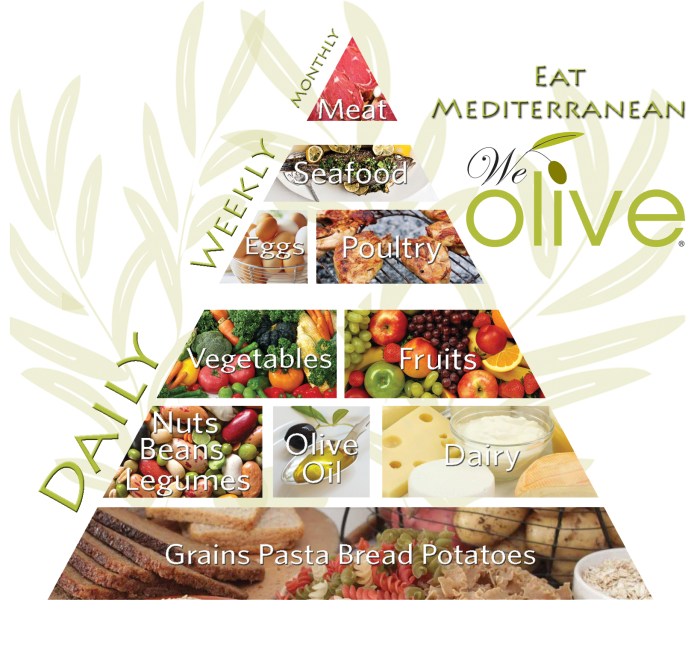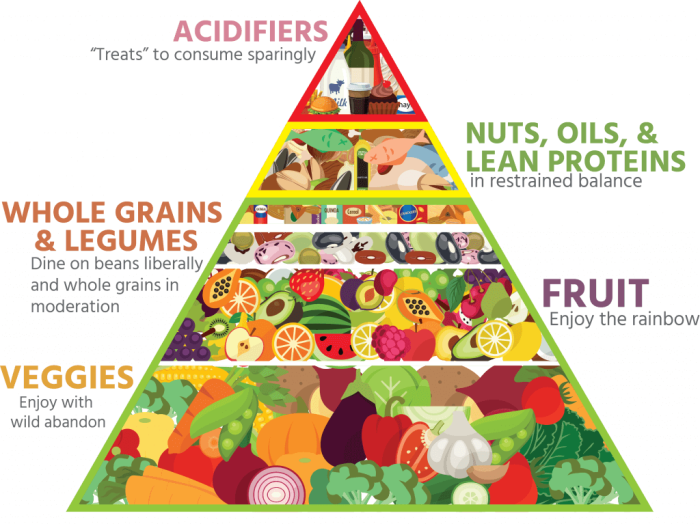
Welcome aboard the Mediterranean diet express, where the scenery is a feast for the eyes, and the food is a party for your taste buds! Imagine sun-kissed shores, olive trees swaying in the breeze, and the tantalizing aroma of fresh herbs wafting through the air. This diet doesn’t just promise a scrumptious journey; it’s also your ticket to a healthier heart and a happier belly!
Rooted in the rich tapestry of Mediterranean cultures, this diet emphasizes whole foods like fruits, vegetables, whole grains, and those divine olive oils that seem to have magical health benefits. Not only is it delicious, but it’s also a culinary philosophy that champions balance, flavor, and a lifestyle that embraces food as a source of joy and connection.
Mediterranean Diet Overview

The Mediterranean diet is not just a way to eat; it’s a lifestyle that embodies warmth, community, and delicious flavors. It’s like a never-ending summer holiday on a sun-kissed beach with a side of olive oil! Originating from the regions bordering the Mediterranean Sea, this diet has gained a reputation as one of the healthiest in the world, celebrated not just for its benefits but also for its rich history and cultural significance.This culinary approach is rooted deeply in the traditions of countries like Greece, Italy, and Spain, where food is central to social interactions.
The Mediterranean diet emphasizes a balance of wholesome foods that nourish both body and soul. By focusing on whole grains, fresh fruits and vegetables, and healthy fats, it encourages a varied diet that mirrors the colors of a vibrant bazaar. The core components consist of:
Core Principles and Components
At the heart of the Mediterranean diet lies a handful of guiding principles that make it both approachable and enjoyable. Here are its essential components:
- Fruits and Vegetables: The Mediterranean diet encourages a daily intake of a variety of colorful fruits and vegetables. These are rich in vitamins, minerals, and antioxidants, essential for maintaining health and preventing chronic diseases.
- Whole Grains: Foods like whole grain bread, brown rice, and quinoa provide complex carbohydrates and fiber, promoting digestive health and keeping you feeling full longer.
- Healthy Fats: Olive oil is the star of the show, replacing butter and other unhealthy fats. Rich in monounsaturated fats, it supports heart health while adding flavor to dishes.
- Nuts and Seeds: A handful of nuts or seeds can be a great snack, packed with protein, healthy fats, and essential nutrients. They are the little powerhouses of the diet!
- Legumes: Beans and lentils are a fantastic source of plant-based protein and fiber, perfect for maintaining energy levels and supporting overall health.
- Fish and Seafood: Regular consumption of fish, especially fatty fish like salmon, provides omega-3 fatty acids that are beneficial for brain health and reducing inflammation.
- Limited Red Meat and Dairy: While not banned, red meat and dairy products are consumed in moderation, making way for healthier alternatives.
- Herbs and Spices: Flavor is key in the Mediterranean diet. Fresh herbs and spices take center stage, allowing you to reduce salt intake while enhancing taste.
“Eat food, not much, mostly plants.”
Michael Pollan
Understanding these dietary staples not only allows one to indulge in delightful meals but also fosters a healthy lifestyle that has stood the test of time. Each ingredient comes with its own set of nutritional benefits, making the Mediterranean diet not just a feast for the senses but also a boon for the body.
Health Benefits of the Mediterranean Diet
The Mediterranean diet isn’t just a culinary delight; it’s a hearty hug for your health! This vibrant way of eating, inspired by the sun-kissed shores of the Mediterranean, boasts a multitude of benefits that can make your heart sing—literally! Packed with fruits, vegetables, whole grains, and healthy fats, this diet is like a superhero for your body, fighting off illness and keeping you feeling fabulous.
Let’s dive into the health benefits that come swimmingly with this delectable lifestyle choice.
Impact on Heart Health and Cardiovascular Diseases
When it comes to heart health, the Mediterranean diet is the equivalent of a first-class ticket to the cardiologist’s Hall of Fame. Research shows that following this diet can reduce the risk of heart disease significantly. A study published in the New England Journal of Medicine highlighted that individuals adhering to this dietary pattern had reduced rates of major cardiovascular events, such as heart attacks and strokes.
The secret sauce? The combination of omega-3 fatty acids from fish, antioxidants from fruits and vegetables, and the magic of olive oil!
“A Mediterranean diet can lower cholesterol levels by 10-15%, giving your arteries a well-deserved break.”
Regular consumption of nuts, seeds, and legumes contributes to improved lipid profiles, which is fancy talk for saying your cholesterol levels get a makeover. With a sprinkle of moderation, the Mediterranean diet can turn your heart into a well-oiled machine, ready to tackle whatever life throws your way!
Weight Management and Obesity Prevention
If you’re looking to zip up that pair of jeans without resorting to extreme measures, the Mediterranean diet is your best friend! This way of eating focuses on whole, nutrient-dense foods that keep you feeling full and satisfied, making it less likely you’ll find yourself ravenously snacking on the leftover pizza at 2 AM. The emphasis on portion control and mindful eating habits means you can enjoy your favorite dishes while still keeping those pesky pounds at bay.
Research suggests that individuals who adhere to this diet often have a healthier body weight compared to those who don’t. One study even found that participants lost an average of 5% of their body weight over six months, just by swapping out processed foods for whole foods!
“The Mediterranean diet is like a delicious trick: you eat more, but weigh less.”
Relationship with Chronic Pain Management Strategies
Chronic pain can be a real party pooper, but the Mediterranean diet might just be the life of the party when it comes to managing discomfort. The anti-inflammatory properties of the foods in this diet can help alleviate symptoms of conditions such as arthritis and fibromyalgia. Think of it as nature’s remedy; the antioxidants and healthy fats work together like a dream team, soothing inflammation and promoting healing.
Incorporating foods rich in omega-3 fatty acids, such as fatty fish and walnuts, can significantly reduce joint pain and stiffness. A study published in the American Journal of Clinical Nutrition found that participants who followed a Mediterranean-style diet reported a decrease in pain levels and an increase in overall quality of life.
“Eating the Mediterranean way may turn down the volume on chronic pain, making life a little more bearable.”
With benefits that touch everything from your heart to your waistline and even your joints, the Mediterranean diet is not just a diet—it’s a lifestyle choice that’ll keep you feeling young, sprightly, and ready to dance like no one’s watching!
Integrating the Mediterranean Diet into Lifestyle

The Mediterranean diet isn’t just a culinary experience; it’s a lifestyle that can make you feel like a Roman goddess or a Greek god, minus the toga, of course! Integrating this delicious way of eating into your daily routine is more than just swapping out your morning cereal for some whole grain bread; it’s about creating a vibrant, healthy lifestyle that dances with flavors, colors, and, most importantly, good health.
Let’s dive into the delicious details of meal planning, exercise, and quitting smoking while being your fabulous Mediterranean self!
Weekly Meal Plan
Crafting a weekly meal plan that keeps your taste buds tingling and your belly satisfied is crucial! Here’s a delightful breakdown, featuring mouthwatering meals that embody the Mediterranean spirit: Breakfast Ideas:
Monday
Greek yogurt with honey, walnuts, and a sprinkle of cinnamon. Consider it the breakfast of champions!
Tuesday
Avocado toast on whole grain bread topped with cherry tomatoes and a drizzle of olive oil. Say hello to your new morning bestie!
Wednesday
Oatmeal topped with fresh fruit and a handful of almonds. A warm hug to start your day.
Thursday
Smoothie with spinach, banana, and almond milk. Green goodness in a glass!
Friday
Frittata with spinach, tomatoes, and feta cheese. Eggs-cellent and easy to whip up!
Saturday
Whole grain pancakes topped with berries and a dollop of yogurt. Weekend brunch vibes!
Sunday
A traditional Mediterranean breakfast platter with olives, tomatoes, cucumbers, and feta. A feast fit for royalty! Lunch Ideas:
Monday
Quinoa salad with chickpeas, red pepper, and a lemon-olive oil dressing. Nutritious and filling!
Tuesday
Whole grain pita stuffed with hummus, cucumber, and roasted veggies. A pocketful of joy!
Wednesday
Lentil soup paired with a side of whole grain bread. Heartwarming and hearty.
Thursday
Caprese salad with fresh mozzarella, tomatoes, basil, and a drizzle of balsamic. Cap-really delicious!
Friday
Grilled chicken wrap with tzatziki sauce and mixed greens. A flavor rollercoaster!
Saturday
Mediterranean grain bowl with farro, roasted veggies, and tahini dressing. Dive into the grain goodness!
Sunday
Baked falafel on a bed of greens with a side of tabbouleh. A party for your palate! Dinner Ideas:
Monday
Grilled salmon with a side of asparagus and quinoa. Omega-3 heaven!
Tuesday
Eggplant Parmesan made with whole grain breadcrumbs. A cheesy delight!
Wednesday
Shrimp and vegetable stir-fry with brown rice. A dance of flavors in every bite!
Thursday
Stuffed bell peppers with brown rice, beans, and spices. Colorful and satisfying!
Friday
Whole grain pasta with marinara sauce, fresh basil, and parmesan. Italian night done right!
Saturday
Roasted chicken with lemon, garlic, and herbs, served with a side of roasted potatoes. A Sunday feast in style!
Sunday
A Mediterranean platter with grilled vegetables, olives, and whole grain pita. A leisurely dining experience!
Exercise Routine
No Mediterranean diet is complete without a sprinkle of exercise! Here’s an invigorating routine that complements your new way of eating and will have you feeling like you could run a marathon (or at least jog to the fridge without losing your breath): Weekly Exercise Plan:
Monday
30 minutes of brisk walking or light jogging. Just you and the open sky.
Tuesday
Strength training focusing on bodyweight exercises like squats, push-ups, and planks. Feel the burn!
Wednesday
45 minutes of cycling, whether it’s outdoors or on a stationary bike. Feel that breeze!
Thursday
Yoga session for flexibility and relaxation. Namaste, my friend.
Friday
30 minutes of dancing—Zumba or just grooving in your living room. Get your groove on!
Saturday
Hiking in nature. Combine fresh air and stunning views for a perfect workout.
Sunday
Rest day! Give your body the love it deserves (and perhaps indulge in some olive oil).To enhance the dietary benefits, consider personal training methods that emphasize functional movements and cardiovascular health, such as interval training or circuit workouts. These can help burn off those delicious Mediterranean meals while boosting your metabolism!
Tips for Quitting Smoking with the Mediterranean Diet
Quitting smoking can be tough, but combining it with a Mediterranean diet can provide the support system you need! Here are some tips for making the transition smoother, like a well-blended hummus:
1. Hydrate
Drink plenty of water and herbal teas. Staying hydrated can help reduce cravings and keep you feeling fresh.
2. Healthy Snacks
Replace cigarettes with healthy snacks like nuts, fruits, and veggies. Munch away instead of puffing!
3. Mindful Eating
Focus on enjoying your meals and the flavors of Mediterranean cuisine. This can distract you from cravings.
4. Support System
Surround yourself with friends and family who support your journey. Share meals and experiences to keep motivation high.
5. Stress Management
Engage in stress-reducing activities like yoga, meditation, or even taking a leisurely walk. Stress can trigger cravings, so find your calm!
6. Stay Active
Incorporate regular exercise into your routine. Physical activity can help clear your mind and improve your mood.
7. Seek Professional Help
Consider talking to a healthcare provider or a counselor specialized in smoking cessation and nutrition. They can guide you through the process.By embracing these strategies, you can successfully quit smoking while enjoying all the flavors and health benefits of the Mediterranean diet. Grab your olive oil and get ready for a fresh start!
Closing Summary
So, as we dock back to reality, remember that embracing the Mediterranean diet is like throwing a never-ending fiesta for your health! With its abundance of vibrant foods and heart-healthy benefits, you’re not just choosing a diet; you’re opting for a life filled with flavor, wellness, and a sprinkle of Mediterranean magic. Cheers to good food and great health!
FAQ Insights
What foods are staples in the Mediterranean diet?
Staples include olive oil, whole grains, fruits, vegetables, fish, nuts, and moderate amounts of dairy.
Can the Mediterranean diet help with weight loss?
Yes, it promotes healthy, balanced eating, which can support weight loss and maintenance.
Is red wine included in the Mediterranean diet?
In moderation, yes! A glass of red wine can be part of this flavorful lifestyle.
How is the Mediterranean diet different from other diets?
It focuses on whole foods and healthy fats while encouraging a relaxed attitude towards eating, unlike strict dieting rules.
Do I need to be Mediterranean to follow this diet?
Nope! Anyone can enjoy the benefits of the Mediterranean diet regardless of their background!






